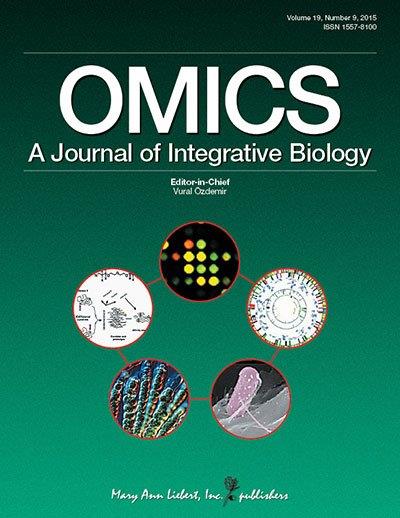For Immediate Release
What Can We Learn From Nutrigenomics Testing?
Contact: Kathryn Ryan
914-740-2250
kryan@liebertpub.com

New Rochelle, NY, October 16, 2015—There is insufficient scientific evidence to support the utility of commercially available nutrigenomics tests that claim to link genetic variants to dietary intake or nutrition-related disorders. While nutrigenomics remains a promising tool for advancing personalized medicine and healthcare, more research is needed before it can help guide health-related decisions, according to a study published in OMICS: A Journal of Integrative Biology, the peer-reviewed interdisciplinary systems science journal published by Mary Ann Liebert, Inc., publishers. The article is available free on the OMICS website until November 16, 2015.
In "Meta-Analysis of Genes in Commercially Available Nutrigenomic Tests Denotes Lack of Association with Dietary Intake and Nutrient-Related Pathologies," Cristiana Pavlidis, et al., University of Patras, Greece, University of Trieste, Italy, and Kingston University, London, U.K., analyzed the published scientific studies on 38 genes that are included in nutrigenomics tests provided by various private genetic testing laboratories. The researchers reported no specific or statistically significant associations between any of the 38 genes and nutrition- or food-related diseases.
Senior author Professor George P. Patrinos notes that “This meta-analysis involved over half a million individuals and 38 genes analyzed in commercially available nutrigenomic tests. The results tell us that the past studies of human genome variation are conflicting as far as associations with nutrient-related pathologies and dietary intakes are considered. We need solid scientific evidence before nutrigenomic testing can be provided as a commercial service by genetic laboratories."
“Nutrigenomics is at the epicenter of the post-genomics funding agenda,” says OMICS Editor-in-Chief Vural Özdemir, MD, PhD, DABCP. Prof. Patrinos and his team report a timely analysis of the commercially available nutrigenomics tests and offer ways forward for the next-generation nutrigenomics research agenda."
About the Journal
OMICS: A Journal of Integrative Biology is an authoritative peer-reviewed journal published monthly online, which covers genomics, transcriptomics, proteomics, and metabolomics innovations and omics systems diagnostics for integrative medicine. The Journal explores advances in the era of post-genomic biology and medicine and focuses on the integration of OMICS, data analyses and modeling, and applications of high-throughput approaches to study biological problems. Social, ethical, and public policy aspects of the large-scale biology and 21st century data-enabled sciences are also considered. Complete tables of content and a sample issue may be viewed on the OMICS: A Journal of Integrative Biology website.
About the Publisher
Mary Ann Liebert, Inc., publishers is a privately held, fully integrated media company known for establishing authoritative peer-reviewed journals in many areas of science and biomedical research, including Journal of Computational Biology, ASSAY and Drug Development Technologies, and Zebrafish. Its biotechnology trade magazine, Genetic Engineering & Biotechnology News (GEN), was the first in its field and is today the industry’s most widely read publication worldwide. A complete list of the firm’s 80 journals, books, and newsmagazines is available on the Mary Ann Liebert, Inc., publishers website.